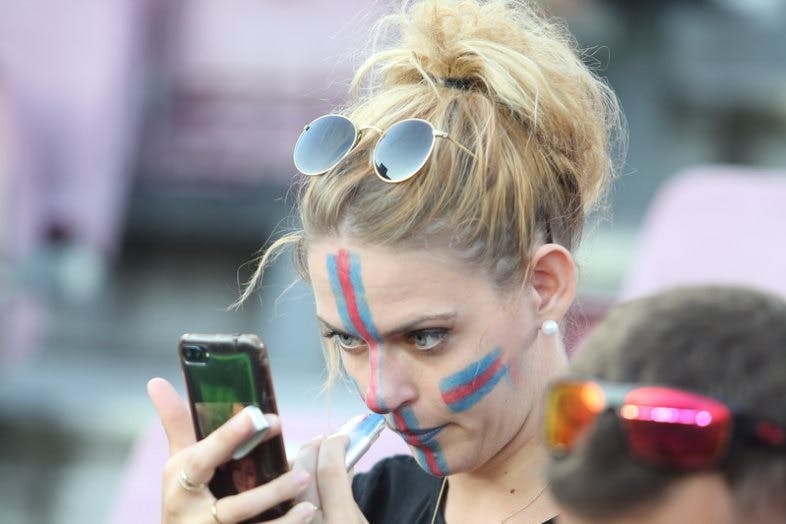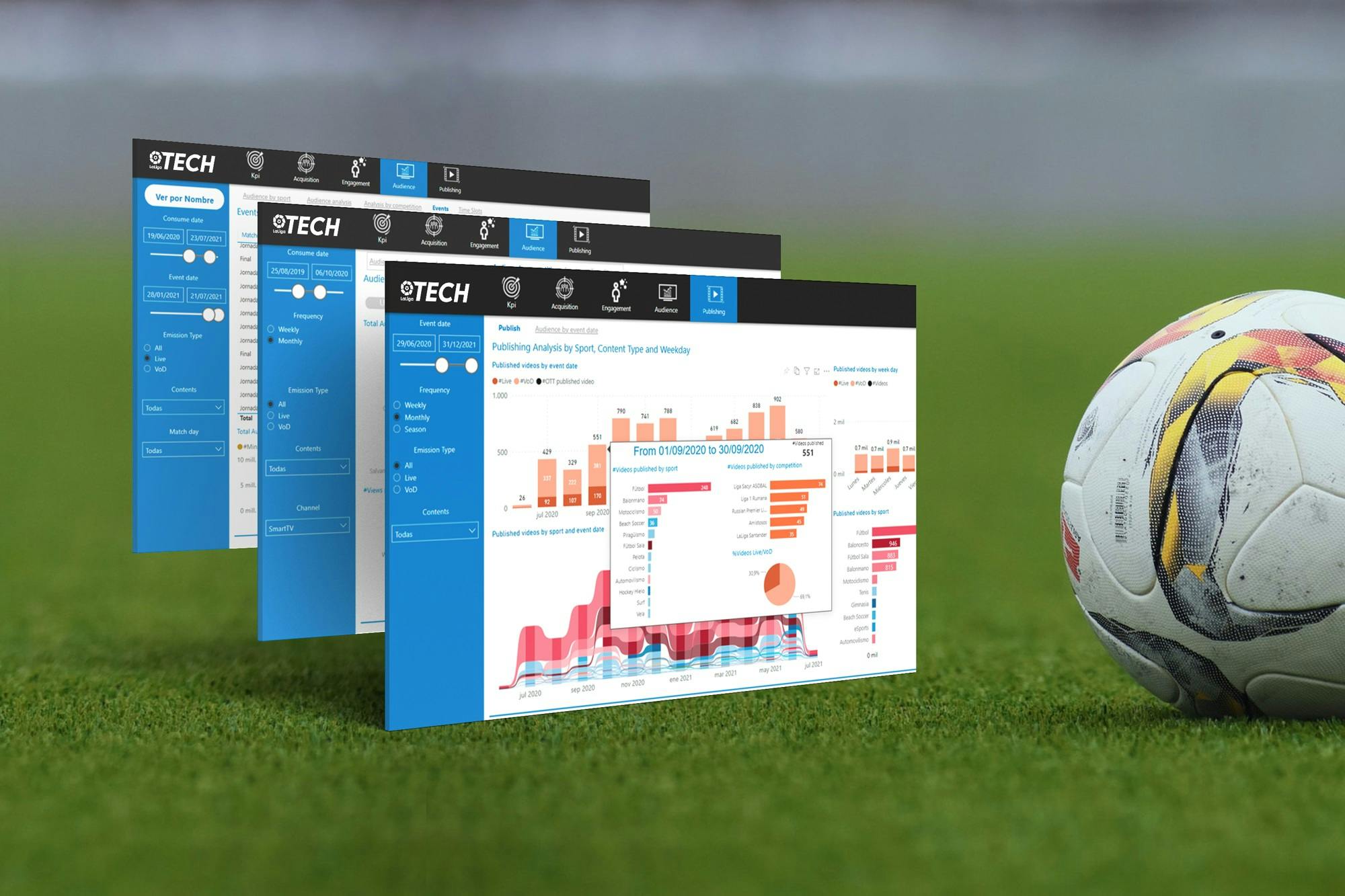Spanish football league operator LaLiga has been a prominent advocate of using technological innovations to drive growth through digital transformation for the best part of a decade.
Now, though, it is sharing its knowhow and services with a wider audience.
Late last year, it was announced that the LaLiga Tech division would be separated into a standalone business, pooling the league’s data and digital transformation services to be commercialised via a single entity.
Mirroring the increasing acknowledgement of the importance of digital and data in the sports industry, LaLiga Tech has grown significantly since beginning with a handful of technology innovation leads to count more than 140 specialists on its staff roster today. The operation has been entirely self-financed by LaLiga.
“LaLiga became a data-oriented organisation seven years ago when we started bringing in data engineers, architects and scientists to design new solutions that were focused specifically on our industry,” Tom Woods, marketing and communications lead at LaLiga Tech, says.
“Digital transformation was not something that had been widely contemplated by sports organisations at the time, but now there is a good general awareness in the industry. We are in a somewhat privileged position of having built up these technologies and services and having tested their effectiveness for an organisation that is the size and stature of LaLiga.

“It became very clear that there was a wider commercial opportunity for us to offer those same managed services for other sports and entertainment organisations. It’s not just the technology we provide, but also the expertise behind it.”
Marketplace response
With numerous sports organisations turning to digital solutions during the pandemic, there is a greater focus on the services provided by the likes of LaLiga Tech than ever before.
Sports clubs, leagues, associations and federations have had to seek creative ways of engaging with followers on digital platforms as, for lengthy spells over the past year-and-a-half, they have been unable to welcome supporters in person.
“For many sports organisations, the ability to reach fans in a personalised way through channels of their choice and create engaging experiences is something that become a very clear need during the pandemic,” Woods says.
However, the development of LaLiga Tech, and the ultimate commercialisation of the unit, was in the works long before the pandemic.
So far, the reaction from the marketplace has been extremely encouraging.
“It’s been a very positive response,” Woods says. “We already have a sizeable group of clients. We have agreements in place with global broadcasters, leagues, clubs and federations across different continents. We offer an approach that can be as broad or narrow as the client wants it to be to meet their needs.”
The solutions themselves have been designed with modularity and scalability in mind, meaning that they can be applicable wherever the client is on their digital journey. Crucially, all of the products can be connected through a single data-driven ecosystem, so that different areas are not working in siloes.
This is complemented by partnerships with specialised third parties, one of which is Microsoft, which expanded its global technology and innovation partnership with the league earlier this year in order to collaborate on developing solutions for media and entertainment businesses and to support the commercialisation of LaLiga Tech.
Fan management
LaLiga Tech products and services are split into the three areas of fan engagement, content enhancement and protection, and competition management.
The fan engagement offering covers smart venues, over-the-top (OTT) platforms, fan activations, mobile applications and web platforms.
In terms of the well-documented growth of OTT, for example, LaLiga was an early adopter and supporter of such digital endeavours in sport – and not only in football.
Having spearheaded the launch in 2016 of LaLigaSports, a project designed to drive growth across 64 national sports federations in Spain, the emergence of OTT served as a further catalyst, elevating LaLiga’s collaborative approach to new levels.
LaLigaSportsTV launched with coverage of 20 different sports competitions in 2019, providing a valuable platform for niche and growing sports across Spain.
Speaking broadly about the fan engagement solutions, Woods explains: “These are our solutions for understanding fan behaviours and engaging with them where they are and on their terms, with the view of driving a more prosperous relationship with them and delivering more lasting experiences.
“We can offer to rights-holders a platform for creating unique fan activation campaigns, competition applications, web platforms, fantasy games and also a solution available for stadiums that combines digital access in-venue with personalised experiences.
“The concept behind all of this is to be able to create engaging, modern and relevant platforms for fans wherever they may be looking for content regarding a sport, competition or brand.
“The technology is designed to keep up with their movements, but everything is still connected to that central ecosystem. So, that allows campaigns and fan offerings to be created that are more relevant and targeted to the needs of individuals.”
that are more relevant and targeted to the needs of individuals.”
Content enhancement
In the area of content enhancement and protection, content integrity and protection products are available, as well as Mediacoach, LaLiga Tech’s data analysis and visualisation tool.
Mediacoach can capture more than 25 frames per second and track thousands of data points per player, per match. The technology was made available by LaLiga to all clubs in the country’s top two divisions, providing opportunities to the minnows, as well as the giants.
Whilst analysing such data has been used to help prevent injuries by allowing coaches to boost their understanding of the players’ physical loads at any given moment, for example, Mediacoach has also been incorporated into coverage of live matches.
Visualisations can include individual player heatmaps or tactical circles and lines being superimposed on the pitch to highlight a team’s changing formation.
“Broadcast partners can exploit that data to create more engaging narratives before, during and after a game. Mediacoach is an enormous resource,” Woods says.
The content protection strand focuses on anti-piracy efforts, enabling real-time monitoring and reporting across online platforms, powered by artificial intelligence (AI).
“We reliably report a removal rate of upwards of 90 per cent for illegal content that we find. One part is detecting the content, and the other part is working with organisations like Facebook, YouTube and Google to get it removed,” Woods adds.
“We also have a tool used for real-time monitoring of betting markets, so you can see betting patterns and detect anomalies. These anomalies suggest a potential integrity issue, a potential infringement or at least the risk thereof, and that is backed up by a team of analysts who can alert the relevant parties.
“So, within the content area it’s about using real-time data to retrieve new information constantly, and to make the most of the content available by maximising its value.”
Competition management
Competition management spans business intelligence services and competition management apps. In essence, it comprises digitising key processes surrounding an event, such as having an AI tool that suggests optimum kick-off times to reach certain markets worldwide.
There are other practical tools associated with this area from an operations perspective, like centralising referee reports, team selections and kit selections, all in the same digital environment.
Across all three areas, there is the ability to generate custom data and tailored data dashboards, connecting all of the solutions and enabling clients to take a granular look at how certain environments are performing.
For example, media companies can analyse how fan-facing campaigns are performing, and how OTT is engaging viewers versus television broadcasts.
“It can all be visualised quickly via these dashboards that we offer, and there are many different types that can be created,” Woods says.
“Essentially, it’s about having insights into how things are performing holistically. I think that has been one of the keys in terms of helping to turn LaLiga into a data-driven organisation, and I think that it will be a key for other organisations as well.
“The more insights that they are bringing together from across those three core areas, the better understanding they will have of what their growth paths look like.”
Fan engagement
In the increasingly competitive and fragmented media and entertainment sector, engaging fans has become considerably more challenging.
According to Woods, though, there is a growing acknowledgement from rights-holders of the need to place data analysis at the heart of engagement strategies.
“We are having a lot of interesting conversations with rights-holders across the world around different solutions that are focused on fan engagement and competitions,” he says.
“We are seeing a growing awareness that a data-driven approach can be really central towards future growth. Over the course of the coming year, I think we will see more organisations looking at things holistically and how to evolve key parts of their competitions around that central premise.”
Sports rights-holders and businesses related to the sports industry are also increasingly aware that a tailored approach is required – not only in terms of communicating with fans and customers to enhance personalisation, but also in terms of internal operational and strategic processes.
“The fact that LaLiga Tech has built up this level of expertise over seven years is something that I think puts us in a compelling position for future growth,” Woods says.
“We’re busy, we’re seeing a lot of demand, and I think the fact that we are a managed service coming from sport means that we have a lot of value to offer. You can’t just install an off-the-shelf product with sports organisations. It has to be tailored.”
Lessons
Looking back on vital lessons that have been learned from LaLiga Tech’s development over the past seven years, Woods is keen to stress the importance of data in helping to bring about positive change.
“It has been pivotal towards our growth as an organisation and it is integral to everything we do,” he says.
“We have been managing these services for ourselves, and for LaLiga clubs, for years, so we already have this data-driven approach baked into our proposition.
“Sometimes you see other adopters doing things in a slightly more piecemeal way – perhaps by buying a platform for their OTT service or investing in certain types of apps or campaigns – but they are not necessarily able to bring them together.
“We have built up steadily, from getting that central data engine in place and then expanding it, using the insights we generated to make the next step.”
The holistic approach that is possible through a centralised system can also allow rights-holders, businesses and organisations to respond more quickly to opportunities.
“One of the big shifts we have seen is that of fans towards digital consumption,” Woods says. “There has been an overwhelming demand for content away from the 90 minutes of a match.
“Over the course of a week, any organisation in sport that does not consider broader, holistic engagement from Monday to Friday is missing an opportunity. It is one of the reasons that our offering evolved into one that sought to engage fans on the platforms that they were looking at, with the type of content they were expecting to see.”
Future
Looking to the future, Woods anticipates the bulk of LaLiga Tech’s clients to be sports rights-holders such as clubs, leagues and federations, although there will be clients from various strands of the sprawling sector.
“Our heritage and the core area of our expertise is with rights-holders,” he says. “We know that other organisations are on a similar journey to us, so there may be some that are more advanced in their digital transformation and just need to introduce certain elements to gain more valuable insights. However, there are others who have not really started, and they will need to bring in that external expertise.”
However, that does not mean there will not be key initiatives in other key segments, like the broadcast and media space, for example.
“We have been a broadcast innovator for a long time, and we already work with some high-profile broadcasters,” Woods adds. “Media will be a very important part of our future, and there will also be targeted work with betting organisations and other brands associated with sport.
“This is not a football play; this is about the evolution of the sports industry. What LaLiga is doing with LaLiga Tech is something that no-one else is doing.”
